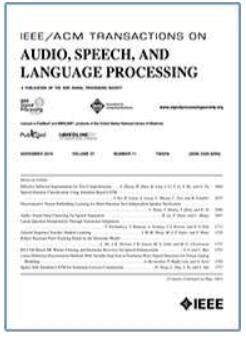TriSAT: Trimodal Representation Learning for Multimodal Sentiment Analysis
IF 5.1
2区 计算机科学
Q1 ACOUSTICS
IEEE/ACM Transactions on Audio, Speech, and Language Processing
Pub Date : 2024-09-11
DOI:10.1109/TASLP.2024.3458812
引用次数: 0
Abstract
Transformer-based multimodal sentiment analysis frameworks commonly facilitate cross-modal interactions between two modalities through the attention mechanism. However, such interactions prove inadequate when dealing with three or more modalities, leading to increased computational complexity and network redundancy. To address this challenge, this paper introduces a novel framework, Trimodal representations for Sentiment Analysis from Transformers (TriSAT), tailored for multimodal sentiment analysis. TriSAT incorporates a trimodal transformer featuring a module called Trimodal Multi-Head Attention (TMHA). TMHA considers language as the primary modality, combines information from language, video, and audio using a single computation, and analyzes sentiment from a trimodal perspective. This approach significantly reduces the computational complexity while delivering high performance. Moreover, we propose Attraction-Repulsion (AR) loss and Trimodal Supervised Contrastive (TSC) loss to further enhance sentiment analysis performance. We conduct experiments on three public datasets to evaluate TriSAT's performance, which consistently demonstrates its competitiveness compared to state-of-the-art approaches.TriSAT:多模态情感分析的三模态表征学习
基于变换器的多模态情感分析框架通常通过注意力机制促进两种模态之间的跨模态交互。然而,在处理三种或更多模态时,这种交互被证明是不够的,从而导致计算复杂性和网络冗余增加。为了应对这一挑战,本文介绍了一个为多模态情感分析量身定制的新框架--"来自变形器的情感分析三模态表征"(TriSAT)。TriSAT 包含一个三模态变换器,其特色模块是三模态多头注意力(TMHA)。TMHA 将语言视为主要模态,通过一次计算将语言、视频和音频信息结合起来,并从三模态角度进行情感分析。这种方法在提供高性能的同时大大降低了计算复杂度。此外,我们还提出了吸引-排斥(AR)损失和三模态监督对比(TSC)损失,以进一步提高情感分析性能。我们在三个公开数据集上进行了实验,以评估 TriSAT 的性能,结果表明 TriSAT 与最先进的方法相比始终具有竞争力。
本文章由计算机程序翻译,如有差异,请以英文原文为准。
求助全文
约1分钟内获得全文
求助全文
来源期刊

IEEE/ACM Transactions on Audio, Speech, and Language Processing
ACOUSTICS-ENGINEERING, ELECTRICAL & ELECTRONIC
CiteScore
11.30
自引率
11.10%
发文量
217
期刊介绍:
The IEEE/ACM Transactions on Audio, Speech, and Language Processing covers audio, speech and language processing and the sciences that support them. In audio processing: transducers, room acoustics, active sound control, human audition, analysis/synthesis/coding of music, and consumer audio. In speech processing: areas such as speech analysis, synthesis, coding, speech and speaker recognition, speech production and perception, and speech enhancement. In language processing: speech and text analysis, understanding, generation, dialog management, translation, summarization, question answering and document indexing and retrieval, as well as general language modeling.
 求助内容:
求助内容: 应助结果提醒方式:
应助结果提醒方式:


